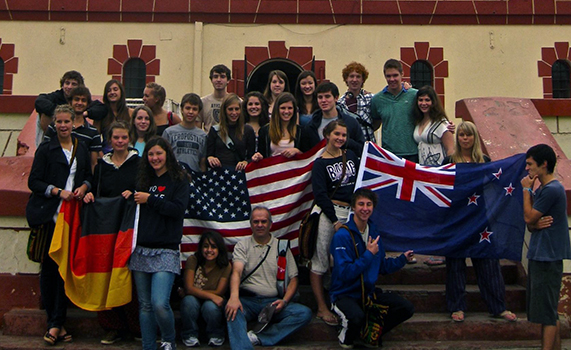
By Connor Kane
Learning a language can be a challenge — but it doesn’t have to be boring or frustrating.
One of the greatest things I gained from my year as a Rotary Youth Exchange Student in Chile in 2009-10 was a deeper love of languages and a better understanding of how to learn them. Rotary members create lasting change in communities around the world. And this often involves travel to new places and cultures and/or working in different languages from one’s native tongue — either as an exchange student, in a scholarship program, or on a service project. Having benefited from my youth exchange, I wanted to pay it forward by sharing some practices I have found helpful in broadening my language skills in Spanish, Portuguese, French, and now German.
1. Don’t wait
The ultimate goal is easy, confident communication with the people you are connecting with. You can reach that goal faster by building up (or improving upon) a good base in the language before you need to.
The most important thing is to build a daily habit of interacting with your target language. Habit stacking, a concept written about by James Clear, involves adding a new habit to one already ingrained into your routine.
For example, “Before I brush my teeth, I will open my Spanish notebook and study for 1 minute.” Or, “After I pour my cup of coffee, I will watch one YouTube video in Polish.”
About 25 minutes a day is a realistic goal for most people. But even five minutes is better than nothing and helps reinforce what you’re learning.
2. Advance skills through your interests
If you’re just beginning to learn a language, choose one resource designed for beginners and use it daily for three months. I love the Coffee Break Languages series, which has fun, free lessons, and affordable paid options for extra materials. The Rocket Languages series is also an engaging resource available in 14 languages.
Once you’re past the beginner stage, find something you are interested in each day, and learn about it in your target language. YouTube is my favorite. If you love cooking, follow a cooking YouTube channel in your target language. If you love cycling, find a channel all about cycling. Spend 25 minutes a day watching one of those videos and noting a few phrases you want to remember. You can add those phrases to an app like Anki to review later. Don’t stress — by actively watching and listening, you’re absorbing more than you think.
3. Don’t think about grammar
When you start, you might be tempted to memorize grammar rules. Don’t!
Your goal is to communicate with people — not get an “A” in the classroom. Luckily, communicating with people is also the best way to learn. You will make mistakes and sound silly sometimes, but native speakers will be forgiving of the mistakes you make.
As you progress in the language, you’ll see and understand grammar in context, and it will be much clearer to you. And by also learning new vocabulary in context (“She ate an apple” instead of “The Apple”), you’ll learn grammar without realizing it.
The more you read and listen to native speakers over time, the better you will intuitively grasp the language.
4. Start using the language
If you’re in the amazing position of traveling to or living in a country where your target language is spoken, immerse yourself and start using the language daily.
Embrace the culture and the unfamiliar sounds of the new language. Find music, comedians, and books from your host country. Learn some of the history. Learn to cook some of the cuisine.
It might not all seem related to language learning, but it is. The more you connect with the culture, the more you’ll embrace the language and its differences. You’ll have a better accent and a better understanding of how people think.
Listen, read, and speak as much as possible. While you’re doing this, your brain is absorbing the language. Then one day, a conversation will happen without any effort at all, and you’ll be amazed at your progress.
About the author: Connor Kane is a former Rotary Youth Exchange Student. He now writes about effective language learning at usinglanguages.com
https://blog.rotary.org/2021/08/12/tips-for-learning-a-language-in-rotary-service/
